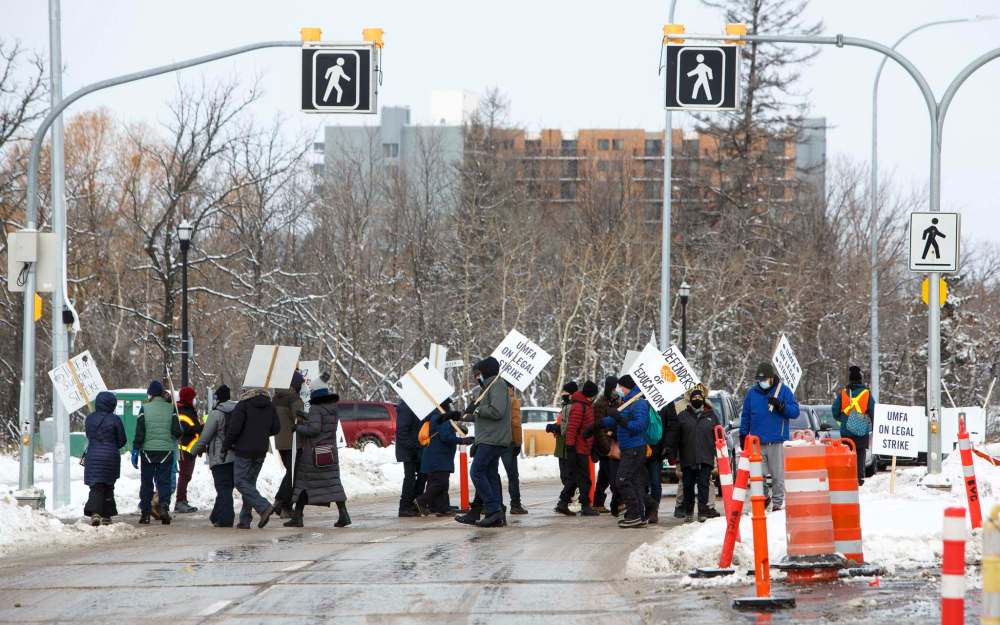Mediator recommends binding arbitration to resolve U of M strike
Advertisement
Read this article for free:
or
Already have an account? Log in here »
To continue reading, please subscribe:
Monthly Digital Subscription
$0 for the first 4 weeks*
- Enjoy unlimited reading on winnipegfreepress.com
- Read the E-Edition, our digital replica newspaper
- Access News Break, our award-winning app
- Play interactive puzzles
*No charge for 4 weeks then price increases to the regular rate of $19.00 plus GST every four weeks. Offer available to new and qualified returning subscribers only. Cancel any time.
Monthly Digital Subscription
$4.75/week*
- Enjoy unlimited reading on winnipegfreepress.com
- Read the E-Edition, our digital replica newspaper
- Access News Break, our award-winning app
- Play interactive puzzles
*Billed as $19 plus GST every four weeks. Cancel any time.
To continue reading, please subscribe:
Add Free Press access to your Brandon Sun subscription for only an additional
$1 for the first 4 weeks*
*Your next subscription payment will increase by $1.00 and you will be charged $16.99 plus GST for four weeks. After four weeks, your payment will increase to $23.99 plus GST every four weeks.
Read unlimited articles for free today:
or
Already have an account? Log in here »
Hey there, time traveller!
This article was published 22/11/2021 (1483 days ago), so information in it may no longer be current.
As striking educators at the University of Manitoba enter their fourth week on the picket lines, a mediator has recommended the parties involved settle outstanding issues in binding arbitration so courses can resume.
Over the weekend, U of M updated community members about a potential next step to address an ongoing labour dispute with the union that represents upwards of 1,200 professors, instructors and librarians at the Winnipeg-based school.
“This ongoing work stoppage is detrimental to our entire community, especially our students, and that is why we accept the mediator’s recommendation,” wrote university president Michael Benarroch, in an email to employees Monday.

The school’s pitch is arbitration — which will involve an independent arbitrator who “is not required to comply with any government mandates” — will put students back in class because the parties will have to conclude a return-to-work agreement.
Faculty association president Orvie Dingwall said in a statement Monday the proposal from mediator Arne Peltz is under review. The union plans to make a counter-proposal with a set of conditions it wants finalized before agreeing to move to arbitration to sort out salary adjustments, she said.
Dingwall added the two sides have not yet agreed on working condition-related issues, including the ability for faculty to take their full vacation at once and a guarantee academics will not be required to teach courses online in non-pandemic times.
(U of M’s stance is the former could disrupt the delivery of some programs and the latter is unreasonable because the school wants to ensure flexible and accessible educational options.)
For months, the parties have been working towards an agreement that will address recruitment and retention challenges.
The union, which went on strike Nov. 2, has repeatedly suggested a provincial mandate on salary increases is interfering in the bargaining process. In contrast, the province has indicated such guidelines are standard practice for a steward of public funds.
The school has stated it wants to conclude a sustainable agreement that addresses faculty concerns.
Over the weekend, U of M announced “significant distance” remains between the offers on the table, which is why it sought advice from a mediator on next steps.
The school said the parties are at odds over general salary increases and targeted market adjustments, with its offer totalling an additional $25.5 million over three years versus UMFA’s proposal that is anticipated to cost $43.8 million during that time.
A spokesperson for the union, however, said its proposal would cost $8.3 million during the first year of the agreement, followed by annual increases of $5.4 million and $5.5 million, respectively.
Disagreement about how offers are being calculated and presented has only added to tensions throughout the labour dispute.
maggie.macintosh@freepress.mb.ca
Twitter: @macintoshmaggie

Maggie Macintosh reports on education for the Winnipeg Free Press. Funding for the Free Press education reporter comes from the Government of Canada through the Local Journalism Initiative.
Our newsroom depends on a growing audience of readers to power our journalism. If you are not a paid reader, please consider becoming a subscriber.
Our newsroom depends on its audience of readers to power our journalism. Thank you for your support.


